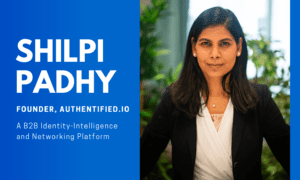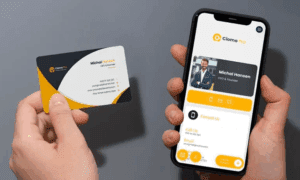Natalia Cebotari is the founder and CEO of Osmos. An entrepreneur with a proven track record building and growing tech companies, she possesses extensive expertise in edtech and social media tech, stemming from her experiences working with the world’s eighth-largest social network. She believes in building meaningful connections, and over the past 10 years, she has scaled social tech products from zero to millions of users, helping over 3 million people increase their skills in the process. Today, as the co-founder of Osmos, a networking platform for entrepreneurs, she is spearheading the “How can we help” movement in social networking.
In a world full of LinkedIn invites and DMs, how can you tell when someone’s being genuine versus just networking for personal gain?
It’s easy to spot someone who’s just trying to collect connections like Pokémon cards. Generic messages are major red flags, and tell me the message was likely sent by a bot. Genuine networking, on the other hand, isn’t about random outreach — it is about doing your homework and crafting something thoughtful that resonates with the receiver. I always say, if you’re reaching out with no clear purpose, you might as well be shouting into the wind! Not only does it waste everyone’s time, but it could also harm your professional reputation.
In my experience, building real relationships is all about intentionality—whether it’s asking a thoughtful question or acknowledging their work. That extra effort makes a world of difference!
How has digital networking changed over the past decade (or the way we communicate)?
The number of bots and automation tools for mailings has grown significantly over the past ten years. After the pandemic, many people kept working online, and it became harder to have a normal conversation with a person because you are competing with spam and bots. And I know from experience–after Osmos launched on Product Hunt (by the way, we won first place as Product of the Week!), I was inundated with spam. It’s physically difficult for me to find valuable messages, and sometimes I lose messages that I’d like to respond to.
I’ve brought this outlook with me to Osmos. We see self-promotion and sales pitches that feel more like a used car lot than a genuine conversation. With so many people vying for attention, it can be overwhelming! Even with new video and content emerging, only about 25% of LinkedIn users say it’s helped them make new business partnerships.
What people want is to cut through the noise and have real, meaningful conversations instead of endless scrolling and surface-level exchanges. It’s time to focus on quality connections that matter!
Have you ever found yourself in an awkward situation where someone overstepped a boundary when networking—how did you handle it?
I’m glad I’ve rarely encountered this issue, but when I have, it’s been like taking a sip of milk and realizing it’s sour—disappointing! The most frustrating scenario is when someone is directly deceptive and misrepresents themselves. They might say they’re offering a partnership, but it’s just a one-way street to sell you something you don’t need.
One example is my recent encounter with someone from Gartner. He sent several emails trying to catch my attention, with each one cranking up the urgency about a supposed client interested in my startup. But when we finally spoke, surprise! There were no clients, only a salesperson too eager to sell me their analytics. Frankly, it felt pretty gross.
Or how about this: an educational platform offers a free trial lesson, but surprise, surprise! That lesson is conducted by salespeople instead of teachers. That’s what I call a direct deception—like ordering a gourmet meal and getting a microwaved hot dog instead!
Is it ever okay to use someone’s name to open doors in your career without their explicit consent?
No. I know people who do that and it pays off for them, but to me, it’s just unacceptable. You’re deceiving two parties at once: the person you’re referring to and the person you’re trying to impress. Sure, it might pay off in the short term, but eventually, the truth comes out, and then your reputation is ruined forever.
How do you balance being friendly and professional without crossing the line into overfamiliarity in digital conversations?
I listen to people. If someone shares a story from their family life, I’ll gladly share something in return, but I’ll never be the one to lead the charge.
What’s the biggest communication mistake people make in networking that could damage their reputation?
The main mistake is calling sales networking; it makes “networking” seem increasingly unpleasant. I have great respect for salespeople; they are the heart and veins of a business. But it feels wrong when true motives are hidden behind a mask. Sure, sometimes it’s awkward to lay all your cards on the table at once, but that doesn’t mean you should lie.
The best connections happen when you and another person share values and dreams, and when you genuinely like each other as individuals and as professionals. In those moments, it feels great, and you want to help each other out.
How do you navigate the fine line between creating value and exploiting personal networks for profit?
Think of it like this: if I treated my network like a money-making machine, it’d probably crash faster than my phone battery at 5% on a busy day. People can sense when your main goal is to turn them into a dollar sign, and trust me, that doesn’t lead to meaningful connections.
The secret sauce? Be genuine! Networking is about building real relationships, and the best way to succeed is to help others succeed. You never know when someone you helped out of kindness might come back with a golden opportunity.
So instead of treating networking like a “what-can-I-get” game, think of it as investing in people’s goals and dreams—without expecting anything in return. That’s how you create real value. People will remember how you made them feel, not how quickly you pushed them into a deal. And who knows, that person you once helped might just return the favor with something way bigger down the road—even a multi-million-dollar surprise.
What steps can networking platforms take to promote ethical connections?
First of all, actively fighting spam and automated mailings. From my experience, Instagram and Whatsapp solve this problem very well, but Linkedin unfortunately does not. It’s not the platforms that are bad or even us, it’s just that there is so much noise on the platforms that people move into small circles that they have built for themselves.
I talk a lot with top managers and entrepreneurs. While most of them are not active on social networks (they have a page and that’s it), they really value and develop one-on-one or small circle communication for themselves. Essentially, professional social media has become a place to look for work or sell through spam or endless amounts of content. It’s become very noisy and there’s very little value. If you’re not doing one of those things – you find another way to socialize, either through one-on-one meetings or in small groups where you can really get to know people personally.
What advice would you give to entrepreneurs and professionals about ethical networking in the digital age?
Build something great and share it with the world. People naturally want to connect with those who are doing something meaningful, so focus on your craft or business. In the end, the best way to grow your network is to create something worth connecting over. It can be something very small, so start with yourself and your business. If you need allies for the first step, tell everyone about your idea and people will come.
Also, don’t treat your contacts like trading cards. It’s not about racking up as many connections as possible—it’s about building meaningful relationships that align with your goals.
Instead of building a Rolodex empire, do your homework. Be intentional about who you’d like to connect with and why. When you make that connection, don’t just hit “accept” and forget about them. Follow up, stay engaged, and connect with people you actually care about, whose projects you respect, and who inspire you. It’s easy to get lost in the flood of DMs and connection requests these days, so standing out with authenticity is key.
And here’s the thing: ditch the transactional mindset. If you’re just thinking about how someone can help you, you’ve already lost. Networking is about creating deep, human-to-human connections. Be the person who offers help first, whether that’s giving advice, making introductions, or being supportive. It’s amazing how much goodwill that can generate, and trust me, it will come back to you in ways you never expected.
Finally, don’t forget: behind every profile picture is a real person with their own dreams, challenges, and goals. Treat them that way, and you’ll build relationships that go the distance.



































